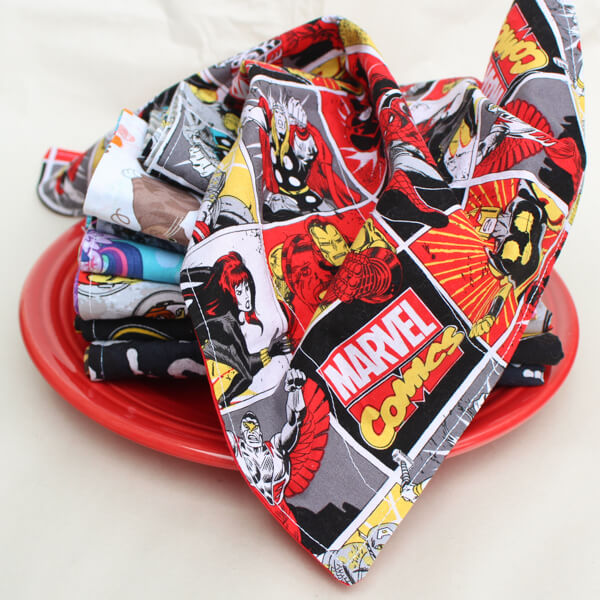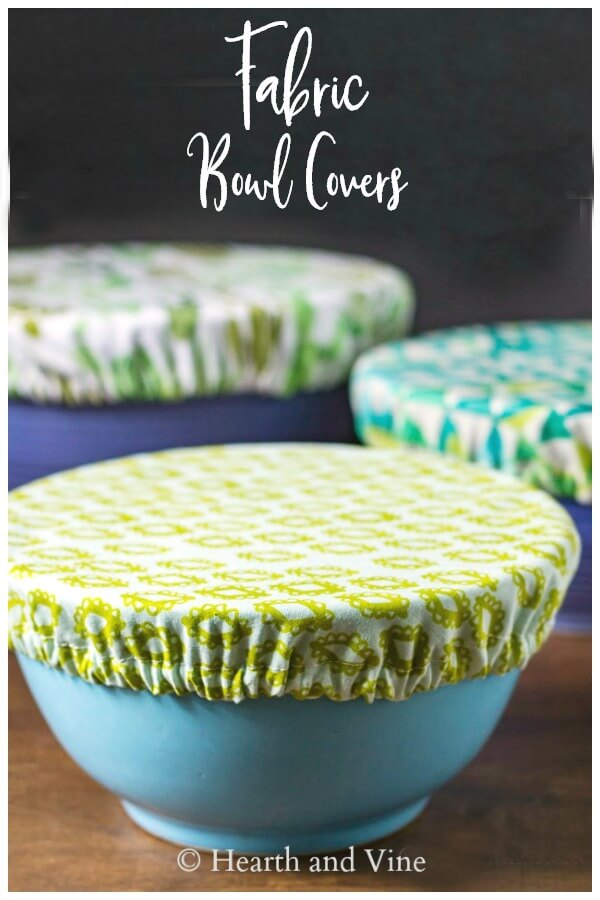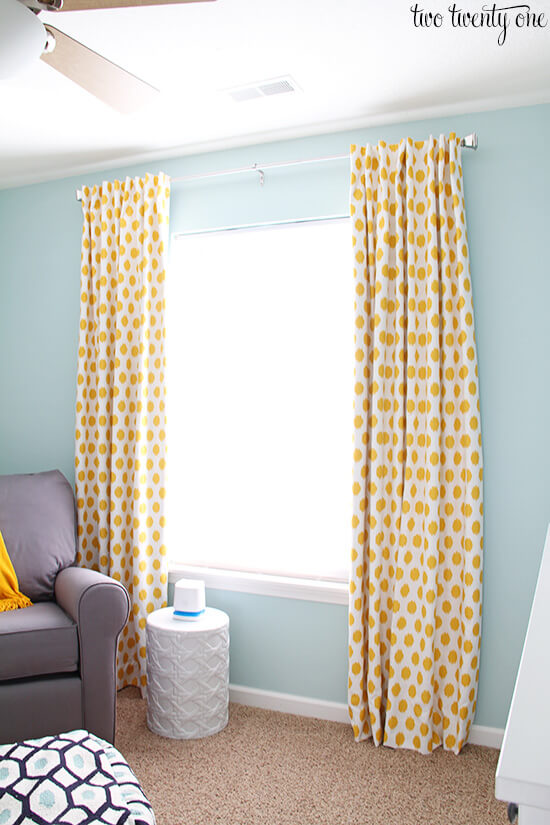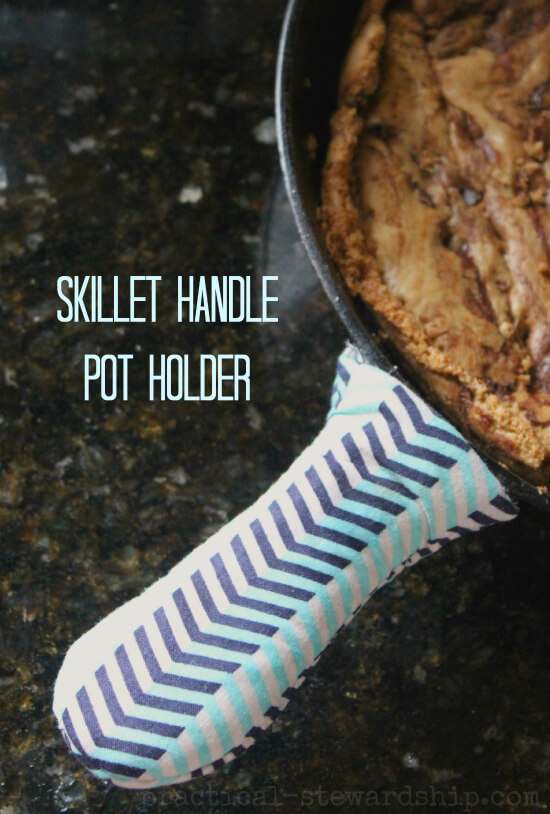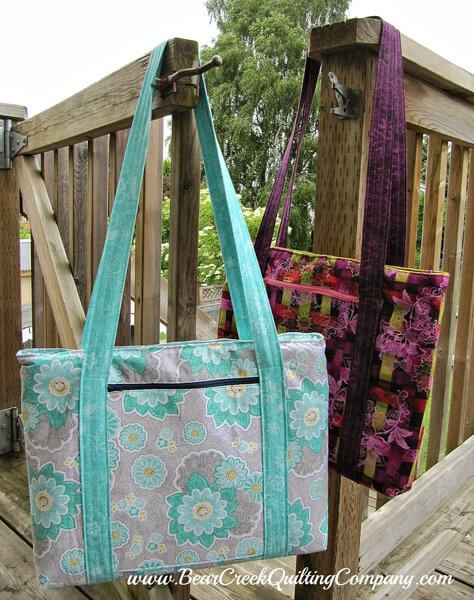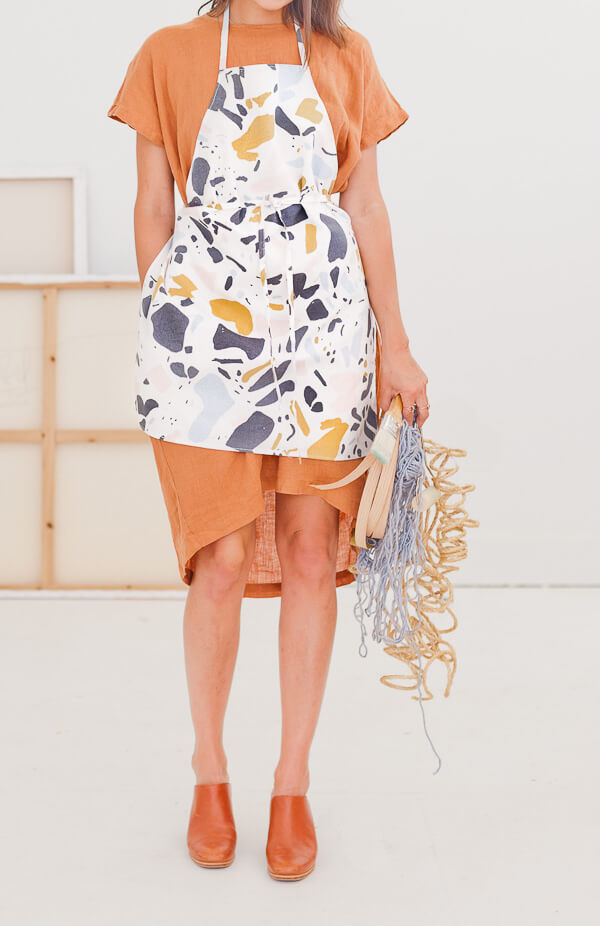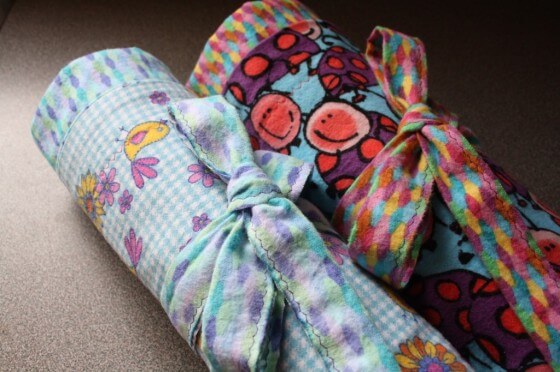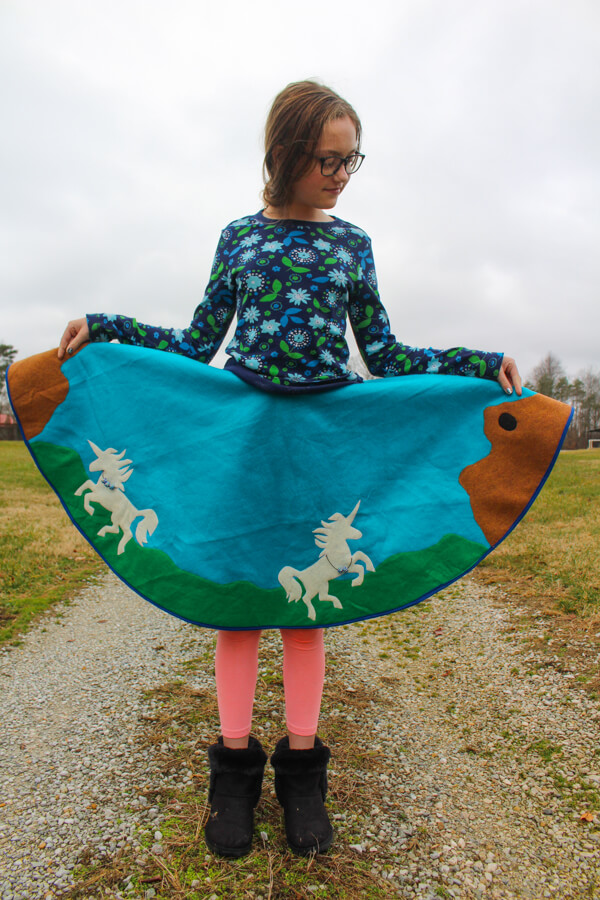Sewing, a skill that lasts a lifetime, is an integral part of the homestead lifestyle. The hands-on, learn-as-you-go experience of creating something useful and beautiful with your own hands, is simply irreplaceable. For decades, homesteaders excelled at mending and sewing to ensure their families were warm and properly clothed.
For today’s modern homesteader, sewing is typically a fun and fulfilling hobby — not a skill required for daily survival. Yet, as more and more people opt for a return to the time-honored skills required to encourage a self-sufficient lifestyle, mastery of basic sewing projects and techniques is a necessity.
You never know when you have to sew on a button or mend a torn seam. Besides, it is quite satisfying to make or mend something rather than going out and buying it at the store.
Whether you’re new to sewing or have been making repairs and hems for decades, read on to find some fun sewing projects to try this weekend or on a rainy day.
Quick And Easy Cloth Face Mask Sewing Projects
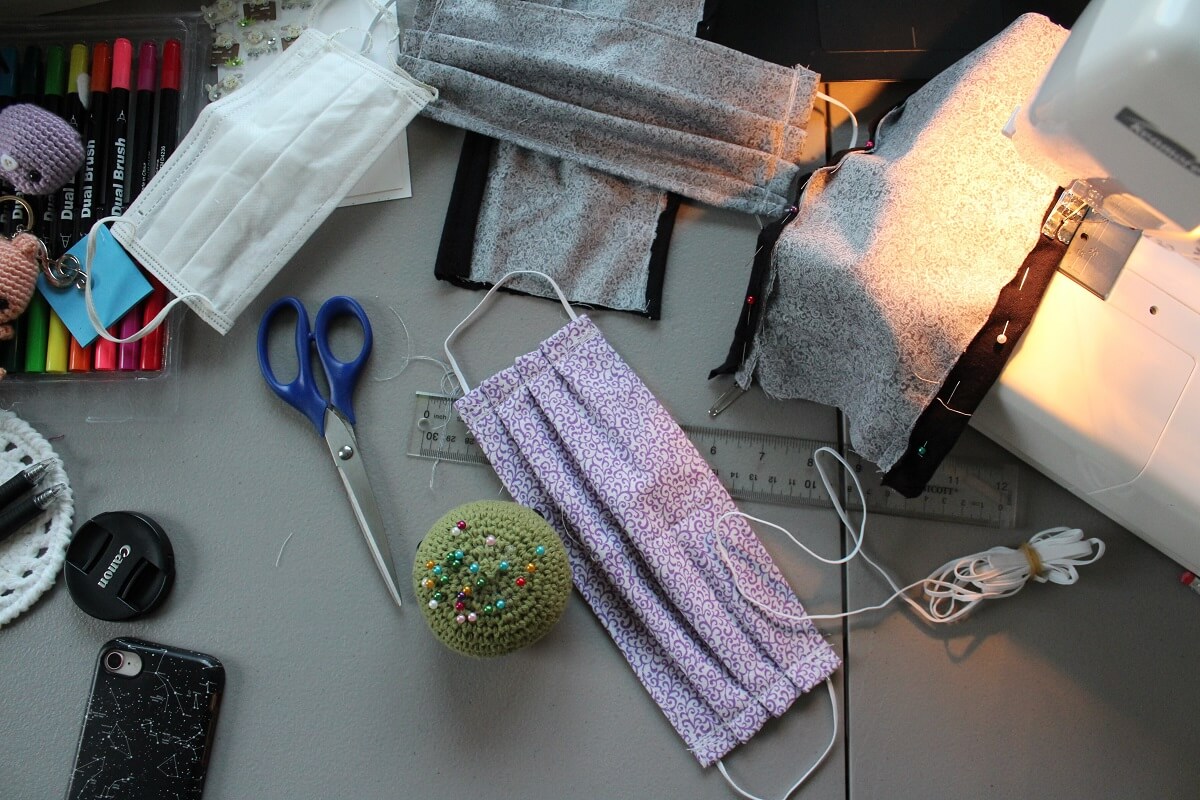
During the cold and flu season, it is prudent to wear a cloth face covering in order to prevent spreading germs and viruses. Homemade face masks can be laundered and used repeatedly. If you are sewing for several family members, choose different colors for every person so you can keep them sorted in the laundry.
If there is a shortage of commercially-produced personal professional equipment (PPE) in your community, help address the challenge by making masks for medical clinics, hospitals, or long-term care facilities that would appreciate the donation.
Homemade face masks are a quick and easy sewing project and a great way to use up material remnants and scraps from other projects. The United States Center for Disease Control provides complete easy-to-follow instructions.
Reusable Napkins
Paper towels and napkins are convenient, but also wasteful and made out of non-renewable resources. Instead, why not sew some reusable napkins that you can toss in the washer after they’ve been used? This tutorial from Crafting a Green World offers step-by-step sewing machine instructions.
Fabric Bowl Cover Sewing Projects
Convenient, easy to make, and a lot more sustainable than plastic wrap, these fabric bowl covers will keep chips from getting stale or lettuce from getting wilty.
Blackout Curtains
While you could buy blackout curtains online, it can be expensive to customize them to fit your exact needs and window size. And if you make curtains at home, you could buy enough material to make matching accent pillows or a slipcover.
Skillet Handle Cover
If you have that one skillet or pot that you’re constantly burning your hands on, consider sewing a handle cover to replace a potholder or dish towel. And aren’t they cute?
Laptop Case
A padded, stylish laptop case is the perfect gift for family and friends. Part of the fun of sewing is the search for the perfect fabric for the projects you have in mind, so enjoy your jaunts through fabric stores and quilting shops.
There are dozens of different styles and patterns for laptop cases available online. I found a stylish pattern from Bear Creek Quilting Company and am having fun crafting gifts for the grandchildren.
Market Tote Bag
Reusable plastic bags are decent for grocery shopping, but a heavy-duty market tote that can support lots of weight is even better. These would make for a wonderful housewarming gift when filled with pantry staples and supplies to stock the new kitchen.
Zipper Pouch
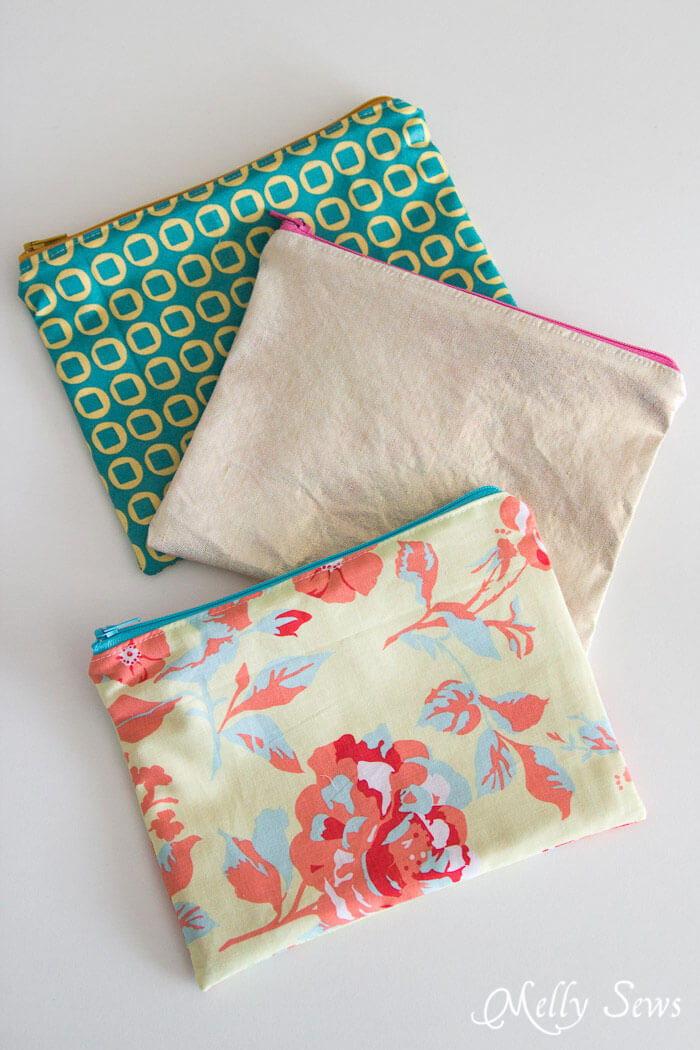
Zippered pouches can be used for lots of things, but they’re particularly useful as overnight toiletry or cosmetic bags. This is a great project for a beginner and can be made fairly quickly.
Zippered Pillow And Cushion Cases
If you want to perk up a room, add a splash of bright color with throw pillows. Quick and easy, you can make a pillow cover (in the fabric of your choice) in less than an hour.
Kitchen Apron
From a simple cotton farm-style apron to a stylish cover when manning the BBQ, aprons are an easy item to sew that makes a great gift. Check out this DIY kitchen apron sewing project that can be made in under 10 minutes.
Jumbo Receiving Blankets
As any new mother knows, you can never have too many receiving blankets. A bundle of jumbo receiving blankets is the perfect gift for any expectant mother on your gift list. These soft, cuddly, and extra-large receiving blankets are simple and easy to make.
DIY Shirt Dress Sewing Projects Tutorial
If you’re interested in sewing your own clothes, a simple shirt or T-shirt dress is a great place to start. This T-shirt dress, in particular, is a classic look that is perfect for any occasion. Just pick a fabric that’s appropriate for the season.
DIY Poodle Skirt Sewing Project
Poodle skirts are perfect for a throwback sock hop, Halloween, or just wearing with a casual T-shirt. Here’s how to sew your own poodle skirt with personalized felt cut-outs.
DIY Weighted Blanket
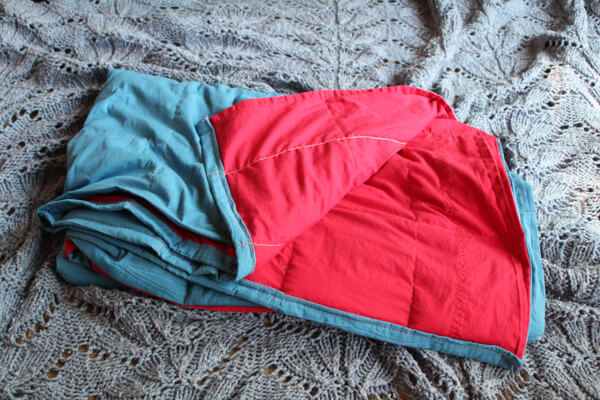
Crafting a Green World offers step-by-step instructions for how to sew your own weighted blanket at home. Not only are weighted blankets super comfy, they are said to help with sleeplessness and anxiety.
Quilting Sewing Projects
Be careful, once you start getting into quilting, you are likely to become addicted. To date, I have made three king-sized quilts: One made of cotton scraps, one crafted from corduroy and flannel for the man cave, and my latest pieced together from silk ties and wool. I requested ties from family and friends. The quilt is entirely made by hand with no machine stitching.
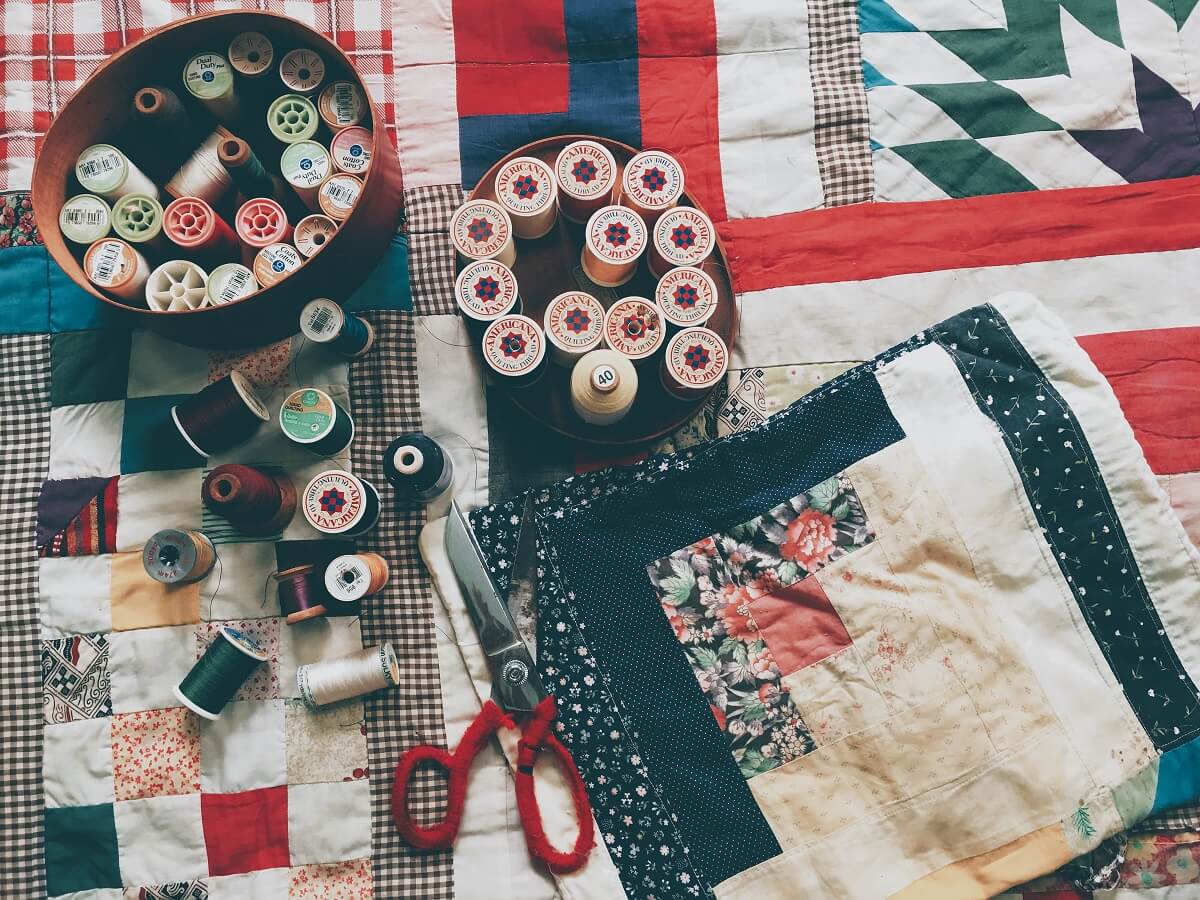
Whether you start out small making a quilted potholder or vest, or you decide to tackle a throw or bed cover, quilting can be as simple or as complicated as you choose it to be.
Related Post: Quilting With Old Clothes
Our sister site, Crafting a Green World, offers a variety of quilting projects for both beginners and pros. Here are a few quilting sewing projects to consider.
- How-to: Sew a Postage Stamp Quilt From Small Fabric Scraps
- How-to: Make a Double-Sided T-Shirt Quilt
- DIY Denim: Sew Your Own Gorgeous Denim Quilt
- 10 Free Modern Quilt Patterns to Sew
- How to Sew a Fibonacci Quilt
Visit the United States National Park Service to discover more about the history of quilting and be motivated by the wide array of patterns for both beginners and advanced seamstresses.
Embroidery Sewing Projects
My Grandma Matilda was an exceptionally gifted lady with a needle whether sewing, quilting, knitting, crochet, tatting, rug making, or embroidery. When we visited the farm when I was a child, I remember the sheets were always white, crisp, and smelled like sunshine and rain.
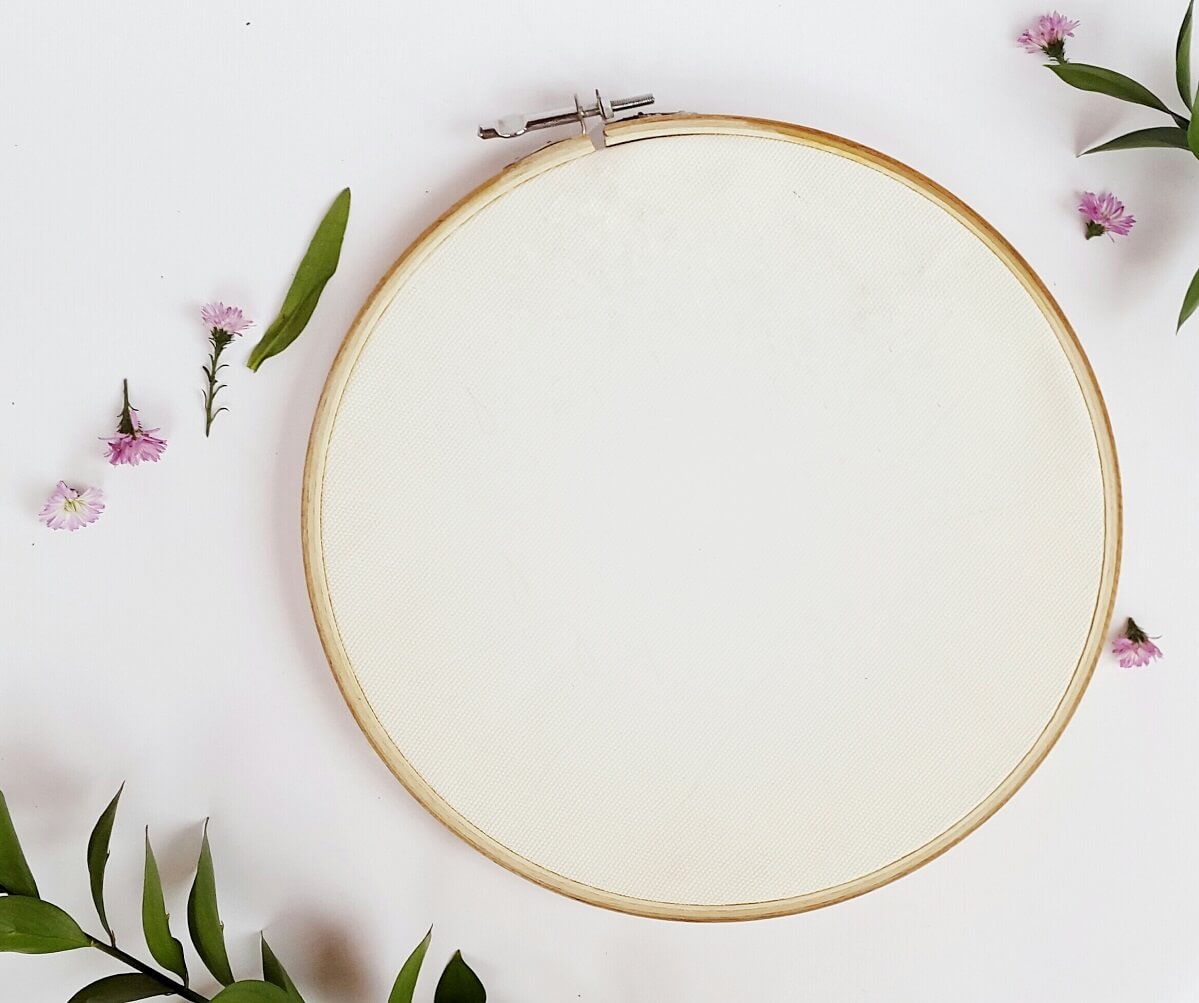
Embroidered tiny red roses adorned borders of the sheets and the trim on the pillowcases. They were a lovely, loving touch for her company linens.
As a child, my Grandmother taught me several stitches and I remember working on embroidering quilt blocks. My next project is to embroider a beautiful set of high thread, white cotton sheets, cases, and pillow shams with tiny red roses — crafting my own company bedding as a thankful tribute to Grandma’s patience and skill.
Around the homestead, there are many items such as tea towels, hand towels, bedding, blankets, and wall hangings. Embroidery adds a personal touch and the decorated items function as a showcase for your talent.
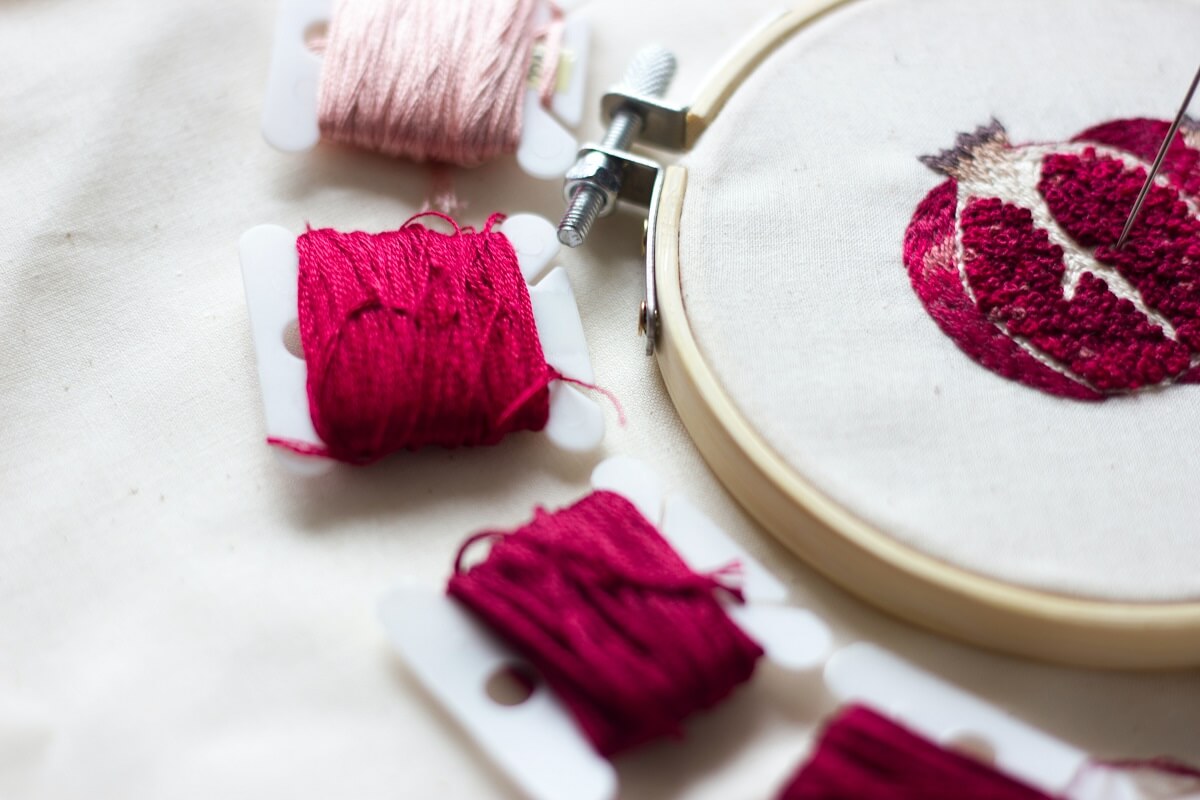
Learning to embroidery is not difficult, and the supplies to get you started are relatively inexpensive and easy to obtain. Hand embroidered items also make great gifts. DMC offers a diverse array of free downloadable patterns and tutorials. Here are a few of our favorites.
Basic Sewing Supplies And Skills Needed To Get Started
For most people, learning the basics of sewing is not that difficult. There is a wealth of instruction sheets and free downloadable patterns available online that explain the fundamental sewing methods and stitches very well.
To get started as far as supplies go, you will need needles, thread, fabric, tape measure, fabric scissors, a thimble, and a pincushion. You can purchase a kit with all the needed threads, fabric, and directions to learn basic stitches.
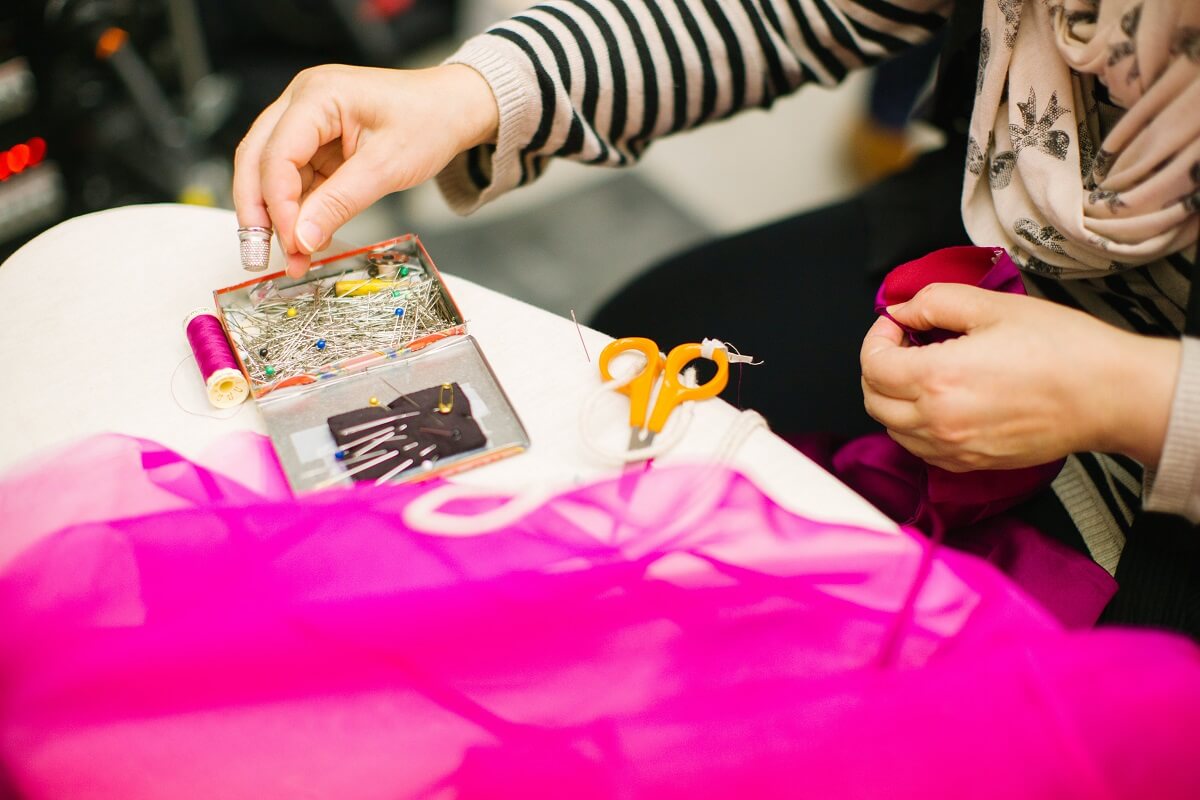
The basic sewing stitches you’ll want to learn in order to make simple repairs and modifications include the running stitch, straight basting stitch, and rand backstitch. All of these are great for hemming and seams.
The slip stitch works best for stitching together two or more separate edges, making it a good technique to use when fixing tears. Finally, the overcast stitch is great for binding or hemming edges that would otherwise tend to fray and unravel.
Why Take Up Sewing?
If you’ve never had the satisfaction of sewing and creating something with your own two hands, you’re missing out. Sewing is an engaging, enjoyable hobby. It’s also a very useful skill to have.
Sewing Saves Money
When you sew clothing for yourself and family members, you are not bound by fashion trends. Choose the fabrics and colors that flatter and fit you rather than being restricted by costly choices at the store.
When you craft your own clothing, you are unique because no one else will be wearing the same outfit. Once you master the art of sewing, you will have a fashionable wardrobe without paying the excessive store markup.
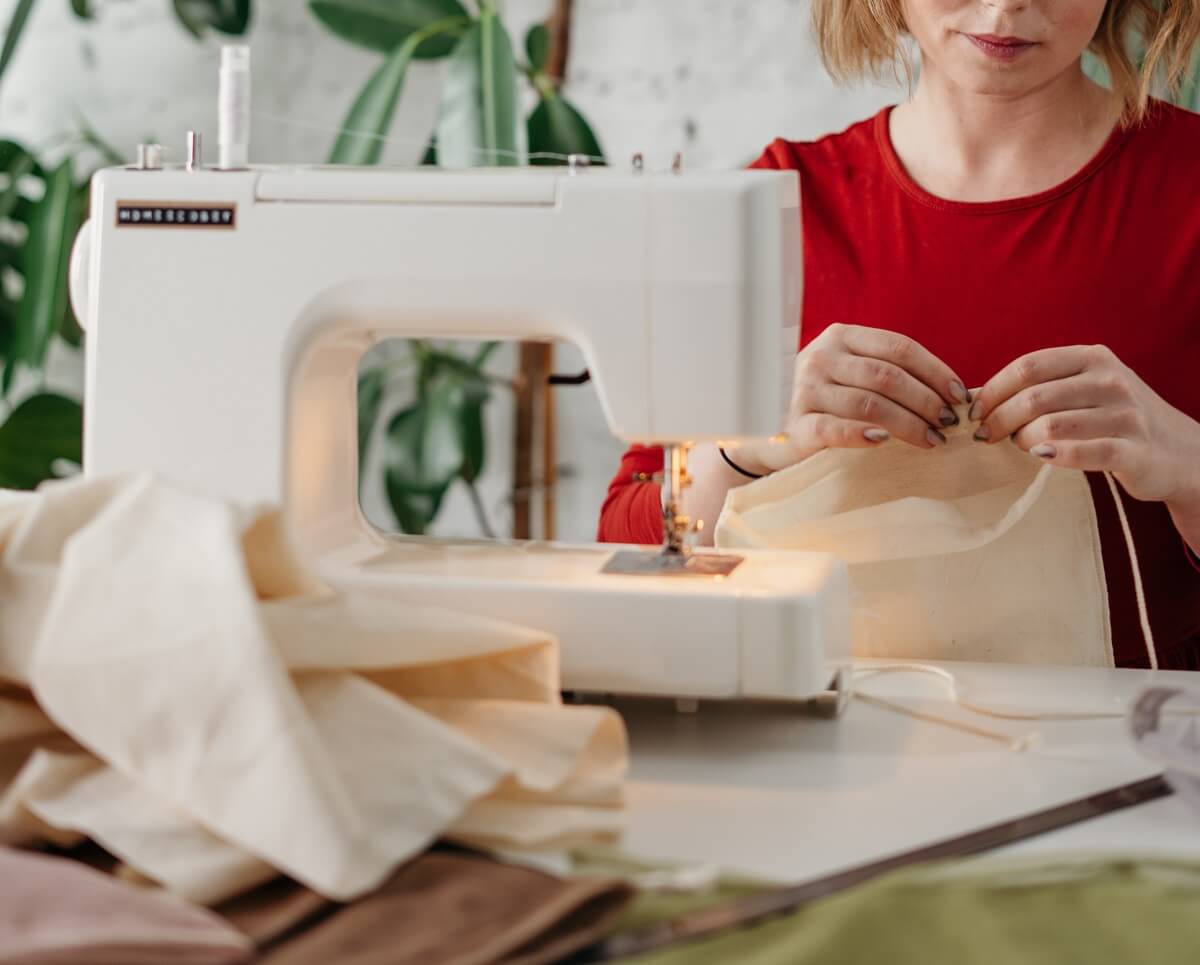
Sewing your own decor items such as quilts, napkins, cushion covers, tablecloths, and curtains can also save a considerable amount of money, and allow you to create beautiful decorating touches and unique, one-of-a-kind gifts.
Sewing Parts Online provides excellent tips for how to use your sewing skills to save money, and a treasure trove of sewing tutorials to get you started.
Sewing Is Good For The Soul
I am learning to love to sew. In times of chaos and crisis, sewing reduces stress and anxiety by encouraging mindfulness. The repetitive, meditative action of sewing encourages feelings of calmness and relaxation, and I find that being forced to concentrate on the task at hand enables me to become immersed in a project and to truly unwind and forget my troubles.
Now mind you, I am not good at sewing yet, but I am improving my skills, and I enjoy the sense of achievement that comes from crafting something homemade.
Planning and implementing a sewing project fosters creativity — which encourages your brain to grow new cells. I justify purchasing beautiful cuts of fabric by telling myself that without new brain cells, brain deterioration begins, so I am not buying the fabric just because it’s beautiful and perfect for my next project. Sewing is beneficial to my mental health.
Another reason I love to sew is it gives me more control over my decorating decisions — like sewing my own kitchen curtains versus purchasing the ones I admired at the mall. The curtains I sewed up myself are the perfect shade of teal to match with my wall covering. I found it is much easier to find the right shade or color of fabric than it is to find it in store-bought window dressings.
References
- Use Cloth Face Coverings, The United States Center for Disease Control
- Marguerite McLoughlin’s Sewing Tools, National Park Service
- Sewing Project Reference Guide, 4-H Canada
- Quilting, National Park Service
- Say It With Thread, Kentucky Historical Society
- How to Use Your Sewing Skills to Save Money, Sewing Parts
- I Really Wish I Could Sew, The Pioneer Woman
- Eight Reasons Why You Should Learn to Sew, Folksy

